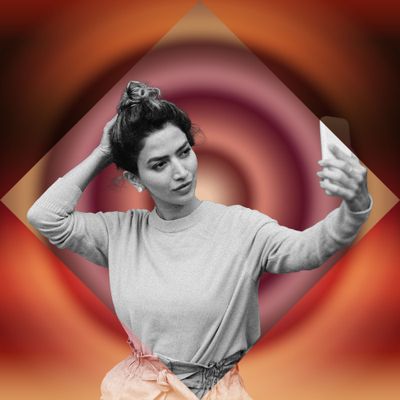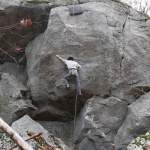
After a somewhat desultory interrogation of my 70-something-year-old friends, I could find no one who had tried the Time Travel age-progression filter that’s trending on TikTok. “Why would we?” asked one friend. “We already know what we look like when we’re old.” Good point. For millennials, though, and for more youthful TikTokers, the filter claims to provide a peek into the future, which is probably why it has garnered over 5 million views.
In spite of my friend’s logical conclusion, I felt the need, for this story, to try the filter myself. And I’m happy to report that I didn’t notice a huge difference in my already aged face till the projection reached 2073, when, at 118 years old, I’ll closely resemble a cadaver. A reasonable forecast! But how accurate is the AI-induced filter, really? I mean, it’s not hard to imagine how — even with a superb skin-care routine like mine — a person might look celebrating a 118th birthday.
Though at least one dermatologist believes in the filter’s accuracy in creating the effects of aging, there are others who doubt it. Dermatologist Mona Gohara, M.D., says she believes what the filter produces is simply a speculation. Why? Because the filter doesn’t take into account genetics or extrinsic influences like sun and pollution exposure, whether you have smoked, if you get enough sleep, or if you’re stressed. “Neither does it take into account what one has done to prevent signs of aging from a product and procedure perspective,” she adds. “I think it may be cool or fun for some people; it also could be discouraging. But accurate? I would say ballpark with a lot of margin for error.”
In fact, there has been some online backlash against the filter, pointing out that the projections in some cases are highly inaccurate.
“Your appearance decades from now depends on your starting point, which in turn depends on your chronological age and your skin age,” says dermatologist Heidi Waldorf, M.D. “And the latter depends on how you’ve cared for your skin.” So, for example, in Waldorf’s case, a lifetime of sun protection, never smoking, and generally maintaining a stable weight, plus two decades of intervention with neurotoxin, filler, and the occasional skin-tightening device means she’s likely to look very different in her 80s than someone who chose no intervention.
“What’s interesting is the difference in results among these filters,” she adds. “The amount of skin laxity and volume depletion varies. For an idea of what you might look like, it’s far more useful to look at your parents, which will tell you a lot more about the future you.”
Steven Dayan, M.D., a facial plastic surgeon, agrees. These kinds of filters “are nothing more than theater, amusement, and a powerful fear-tactic tool to sell a product or service,” he says. “Aging — like the future — is notoriously hard to predict, and too often the projections are wrong.” He echoes Waldorf’s advice that if you really want the best guesstimate of what you’re going to look like, just look at your parents. (Keeping in mind that if your mother never used sunscreen, was a heavy smoker, and rarely slept, you’ve probably got yourself a head start in the aging department.) Facial plastic surgeon Michelle Yagoda, M.D., offers an alternative: “For now, if I had to bet on a modality for accurate aesthetic predictions, I’d put my money on computer-assisted presurgical imaging.”
And what about the psychological effects of such projections? One psychiatrist suggested it may be comforting to know you’ll look like anything at an older age — in other words, seeing your aged face confirms your presence in an uncertain future. For a young adult, the projection can feel like a kind of fantasy because in their own mind, they’re still relatively immortal. Even if the filter offers a coarse representation, it may be enough to provide fuel to such a fantasy. For older millennials whose faces are starting to manifest an accumulation of years, the filter has elicited frightened and even sad feelings about aging.
A story in The Sun reports one person writing, “Did the aging filter on TikTok then immediately started crying.” Another, with a bit more irony, declared that “whoever made the aging filter on TikTok is going to hell,” a remark that especially interested me as it seems to reflect not only a fear of aging but anger at the very idea that one might someday be considered elderly. I agree that it feels like a nasty trick to give us humans consciousness and then, once we’re aware of it, constantly remind us that at some point it’s going to be revoked — and what is a more potent reminder than an aging face? But the unease and even revulsion sometimes expressed at a vision of our older selves also emphasizes our culture’s ageist attitudes. (My favorite headline, from The Sun: “‘I started crying’ admits TikTok user as viral ‘Age Progression’ filter reveals what you’ll look like in 50 years.” Plus, how to use it.)
As for the deeper psychological impact, Charlotte Shane, reporting in Wired, contends that this filter, like others, is just for fun — not to give you an accurate representation but instead “meant to make you see and feel something new.” That may be the case, but the new feelings many girls get from some online filters are at best unhelpful. Girls are more likely than boys to use filters for beautification, rather than for play, starting at an early age, and social media is known to have negative effects on the mental health and body image of young people, reports Tate Ryan-Mosley in MIT Technology Review. It doesn’t seem like much of a stretch to suggest that age-progression filters may drive a person with questionable self-esteem further into a rickety self-image. (“TikTok aging filter making me realize I need plastic surgery,” wrote one user, according to The Sun.)
If age-progression filters could help us accept that youthful beauty is transitory and that mortality is inevitable, I reckon that might make using them a valuable pastime. But I have the feeling that, bottom line, they’re having the exact opposite effect.
More From This Series
- A Laser Expert Shares Solutions for Facial Birthmarks
- Dealing With Dermatitis? A Dermatologist Weighs In.




